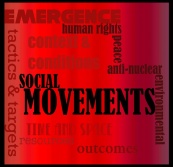Social Movements – Good or Bad?
Social movements are the cornerstone of the American freedom of speech. Like tiny rebellions they are everywhere and the number and scope keeps growing and expanding. Social movements are a major vehicle for ordinary people’s participation in public politics. This political or cultural conflict is formed from a shared collective identity. Some of the more well-known movements are civil rights, feminist, disability, anti-war, Ku Klux Klan, Labor, environmental, Christian fundamentalist and a list of at least a hundred more most of us never heard of. Whether you agree with a movements agenda or not it is a groups right to protest and if successful, bring about social change.
I’ve belonged to a few briefly throughout my life but found myself less and less active because I eventually found myself in conflict with the movement’s conduct more often than with the barriers preventing social change. Social influence can be a powerful tool used to create conformity. It can be used constructively or destructively depending on the agenda of the dominate members. As humans we crave to belong, to be part of something and to fit in. How far we are willing to adjust in order to gain acceptance and avoid rejection depends on our level of self-confidence and strength of our self-identity. Conformity is the engine of “movements” like the Civil Rights Movement or the Disability Movement. By color or disability you are automatically accepted but may not necessarily agree with every concept or ideal that comes from the groupthink meetings forming them.
Groups base their success in the advocacy arena on projecting a united front. Although the discrimination barriers they are fighting to remove may never have happened to you there is a feeling of guilt if you don’t join and support the movement. The same person who belongs, however, usually acts, dresses and speaks differently at work or church or around gatherings that include non-disabled or Caucasian peers. It’s that compelling need to be accepted in our surroundings that pushes aside the true identity of most people. Although well intended most of these groups demand unquestioned allegiance and discourage individual thinking. Conformity in purpose, conformity in thinking, conformity in actions.
Even when given the opportunity to voice their opinion in a groupthink meeting most members would rather stay silent than be ridiculed by the dominate members. This lack of speaking up is brought on by a member or members so overbearing and intolerant of others opinion that intimidation rules the meeting. The consequence is that the group is weakened by members who do not have full buy-in of the purpose they are fighting for. These disenfranchised members speak differently when alone but are paralyzed by fear of rejection to speak up in the group.
This kind of intolerant atmosphere can easily be used destructively to incite members to action like hunger strikes, property damage or even riots. Those who are not comfortable with conflict get swept along regardless because of the need to impress the others. To them it’s not about the purpose as much as it’s about performing to the expectations of others. Some “movements” have made much needed social reform and have been very successful in building cohesiveness among their followers. However, I’m very careful when participating in any movement and observe if there are dominate leaders who do not encourage others ideas and questions. If I see it exists, I’m out of there.
